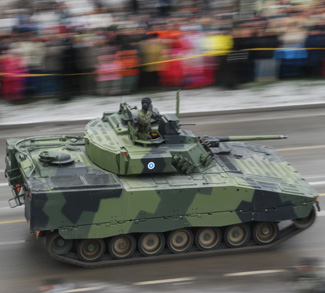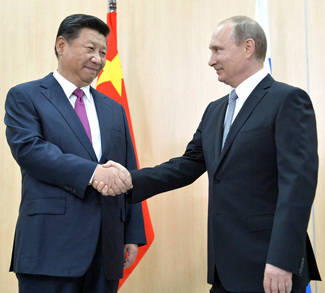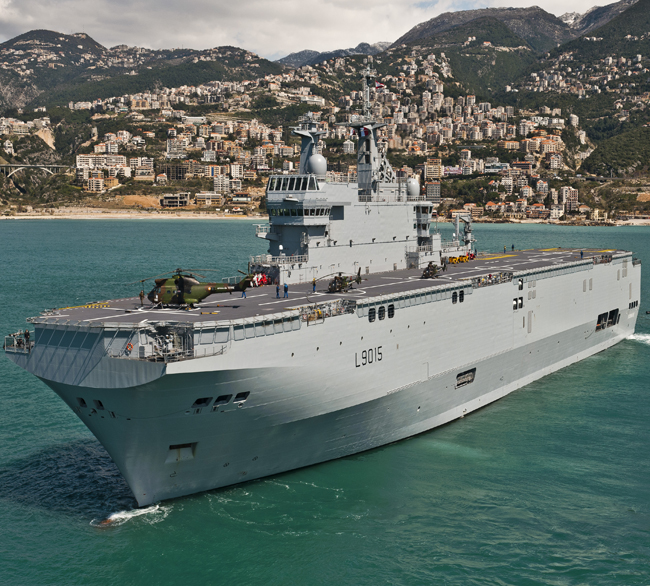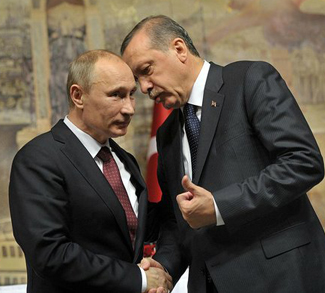Earlier this week, the Russian defense ministry announced that it would be launching military exercises 50 kilometers from the Russo-Finnish border.
“The motorized brigade based in Alakurtti will be tested for the first time,” the ministry said in a statement.
The Russian military base in Alakurtti had been out of operation since 2009; it is now expected to be the headquarters of Russia’s Northern Fleet signals intelligence unit.
The military operations will include 110 planes and helicopters and 38,000 troops. Forty-one warships and 15 submarines will also take part in the exercise.
In response, Finland has begun to test NH90 helicopters in Lapland, while neighboring Norway carried out its largest winter exercise in Finnmark – the northernmost Norwegian region which borders both Finland and Russia – since 1967.
The military exercises come shortly after Sweden and Finland signed a defense pact in mid-February that foresees the creation of a joint naval task force by 2023.
The two countries will also grant each other access to their marine bases, as well and participate in drills for chasing submarines. Sweden reported spotting a Russian submarine in waters adjacent to its capital Stockholm in October 2014. The Swedish military conducted another search for a Russian submarine in January 2015; both searches failed to produce definitive data that a Russian submarine had infiltrated Swedish waters.
The pact gives more security to the two countries, neither of which are members are NATO, Finnish Defense Minister Carl Hagland said.
“This gives us a concrete ability to work together, first and foremost in peace time, but also in times of crisis should we choose to do so,” Hagland told Swedish news agency TT.
Sweden also signed a defense agreement with Denmark, a member of NATO, earlier this month.
Russian planes have sharply increased the amount of time spent flying over NATO airspace (Norway is also a NATO member and monitors flights from the Royal Air Force base at Mågerø in southern Norway. NATO scrambles in the area – which occur when NATO military planes intercept unwanted aircraft – happened 49 times in 2014, and have happened four times already in 2015. NATO had to scramble in response to Russian jets 400 times overall in 2014.
The Baltic states – which include Latvia, Estonia, and Lithuania – saw more than 100 Russian planes intercepted by NATO air power in 2014. On March 18, NATO intercepted 11 Russian aircraft over the region. The Baltic states are all former Soviet countries and achieved their independence in 1991 when the Soviet Union crumbled. All three are now members of the European Union.
Increased Russian activity in Scandinavia raises the question of whether Sweden and Finland should be brought into NATO.
Sweden and Finland have both steered clear of NATO, opting to remain neutral in armed conflicts. But recent polls in both countries show an increasing number of citizens who would support joining the international defense alliance, even at the risk of antagonizing Russia – which has often criticized the expansion of NATO.
Joining the security body would theoretically bolster Swedish and Finnish defenses, given NATO’s mission to provide collective security for all members, proponents of this action say. But critics of the idea argue that absorbing these two Scandinavian states into NATO will put them on the fast track to military conflict with Russia, which particularly takes umbrage when bordering states join the organization.
It might be just as effective – and significantly less aggressive towards Russia – for these two countries to step up involvement with the Nordic Defence Cooperation, which includes all of Scandinavia plus Iceland.
For now, both Sweden and Finland have participated in NATO’s Partnership for Peace activities in Kosovo and Afghanistan, while Sweden has previously worked with NATO in Bosnia and Herzegovina. Earlier this month, both countries joined other NATO states to take part in a series of non-military crisis management exercises.
Should Russia attempt to annex Swedish or Finnish territory, it is extremely unlikely that NATO would fail to come to their aid. For this reason, it makes little sense for Helsinki and Stockholm to join the organization – and if recent statements from top-level government officials give any indication, it doesn’t like they will be doing so any time in the near future.




